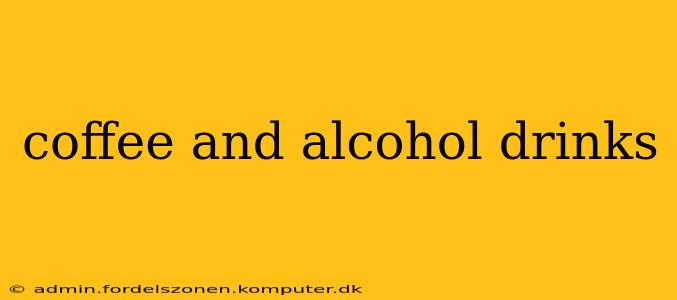Coffee and alcohol. Two beloved beverages, often enjoyed separately, but sometimes finding themselves mixed in a surprising number of cocktails and concoctions. This exploration delves into the fascinating relationship between these two popular drinks, examining their individual effects, the potential consequences of combining them, and answering some frequently asked questions.
What Happens When You Mix Coffee and Alcohol?
The effects of mixing coffee and alcohol are complex and depend on several factors, including the amount of each consumed, the individual's metabolism, and their tolerance to both substances. While coffee's caffeine can temporarily mask the sedative effects of alcohol, it doesn't actually counteract the alcohol's impact on the body. This means you might feel more alert, but your blood alcohol content (BAC) remains unchanged. This can lead to risky behavior because you underestimate your level of intoxication.
The caffeine in coffee can also exacerbate some of the negative side effects of alcohol, such as dehydration, anxiety, and heart palpitations. The combined diuretic effect can lead to significant fluid loss, potentially resulting in a hangover that's more intense and prolonged.
Is It Safe to Mix Coffee and Alcohol?
Technically, mixing coffee and alcohol isn't inherently unsafe in small amounts for healthy individuals. However, the risks significantly increase with higher quantities of either substance. The primary danger lies in the potential for misjudging your level of intoxication. Feeling alert due to the caffeine can mask the impairing effects of alcohol, leading to poor decision-making, impaired coordination, and increased risk of accidents.
Does Coffee Help with a Hangover from Alcohol?
Many believe coffee helps with hangovers, but the evidence is mixed. While the caffeine might provide a temporary boost in alertness and help combat fatigue, it won't alleviate the underlying causes of a hangover—dehydration and inflammation. In fact, the caffeine's diuretic effect might even worsen dehydration, prolonging the hangover. The best way to combat a hangover is to focus on hydration (water is best!), rest, and avoiding further alcohol consumption.
What are Some Popular Coffee and Alcohol Drinks?
Several popular drinks combine coffee and alcohol, often offering unique flavor profiles. These range from simple additions of coffee liqueur to espresso martinis, Irish coffee, and various coffee-infused cocktails. The key is moderation and awareness of the combined effects of the alcohol and caffeine.
Can Mixing Coffee and Alcohol Affect Sleep?
Yes, mixing coffee and alcohol can significantly disrupt sleep. While alcohol initially induces sleepiness, it disrupts the later stages of sleep, leading to less restful and restorative sleep. The caffeine then further interferes with sleep, potentially causing insomnia or poor sleep quality. This can lead to daytime fatigue and impair cognitive function.
Does Coffee Counteract Alcohol's Effects?
No, coffee does not counteract the effects of alcohol. Caffeine can temporarily mask some of the sedative effects, making you feel less intoxicated, but it doesn't reduce your blood alcohol content. This is a crucial point to understand to avoid risky behavior. Always be mindful of your alcohol consumption regardless of whether you've had coffee.
Conclusion
The combination of coffee and alcohol presents a complex interplay of effects. While enjoyable in moderation, it's crucial to be aware of the potential risks, particularly the masking of intoxication. Responsible consumption is key to ensuring a safe and enjoyable experience. Remember that individual reactions can vary, and it's always wise to prioritize safety and moderation.
